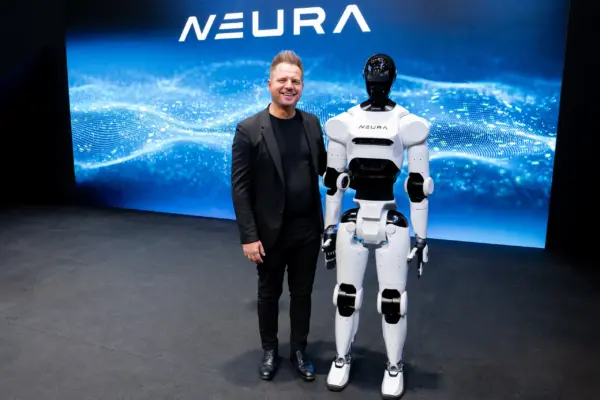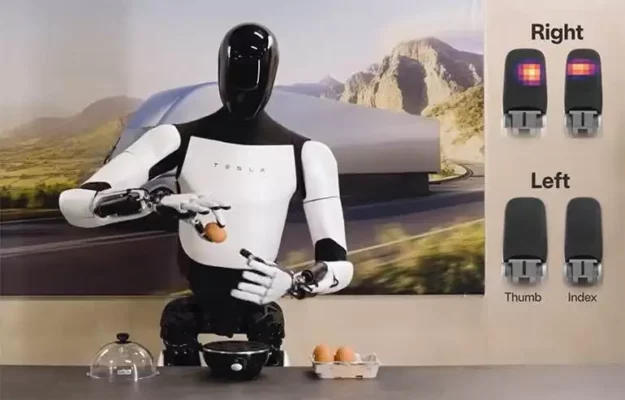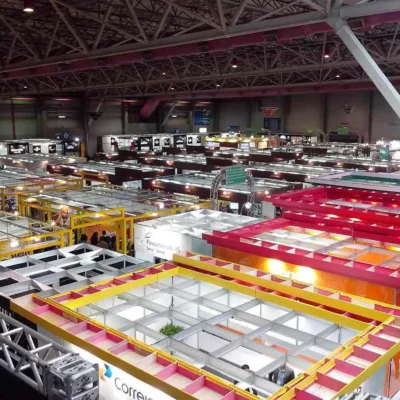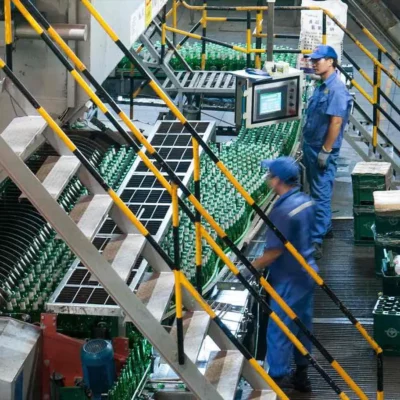Industrial (articulated) robots are changing the game. These robots are flexible, precise, and can do a lot, from building cars to making electronics. Wondering how they can help your production? You’ve come to the right spot. We’re diving into where these robots shine across industries. Whether you’re in automotive, electronics, or food processing, you’ll see how these robots can make a big difference.
Get ready to explore how articulated robots can upgrade your manufacturing line and boost your productivity.
What is an Industrial (Articulated) Robot?
Think of articulated robots as your factory’s multi-tool. They have arms that bend, twist, and turn, thanks to their joints. This means they can move in ways most machines can’t. They’re like having a super-flexible helper on your team.
Why is this great for you? These robots speed up your work, are spot-on accurate, and don’t tire out. They fit right into your team, working safely beside your people. This makes adding them to your line smooth and hassle-free.
Here’s the cool part: articulated robots are super adaptable. Need to change from making car parts to packing snacks? They can switch tasks quickly with a quick program change. This flexibility is a big win for any business wanting to keep up and cut costs.
So, if you’re aiming to boost your output, increase accuracy, or just streamline your operations, these robots are a smart pick. They’re not just another piece of machinery; they’re a key player in making your production better.
6 Industries that Utilize Industrial Articulated Robots:
1. Automotive Industry:
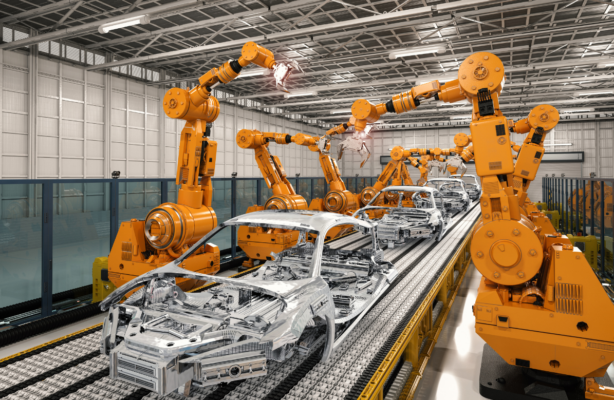
In the car-making world, you need to be quick and accurate. That’s where articulated robots come in handy on your assembly line. Imagine robots welding frames, fitting dashboards, and painting cars perfectly every time. They work fast, without ever getting tired, and they don’t make mistakes.
These robots are also great at installing windshields and doors, making sure every car is top-notch. This cuts down waste and saves you time.
Here’s the best part: these robots easily switch tasks. Moving from making sedans to SUVs? They can adjust with just a simple update. This flexibility means you can quickly respond to what car buyers want.
Safety is another big win. Robots do the risky jobs, like handling hot metal or using harmful paints. This keeps your team safe, letting them focus on the work that needs a human touch.
For anyone in the car industry, using articulated robots is a smart move. They help you work smarter, not harder. You get a safer, more flexible production line. With these robots, you’re not just building cars; you’re gearing up for the future.
2. Electronics & Semiconductor Manufacturing:
In the world of making electronics and chips, getting every detail right is key. That’s where articulated robots step in. They handle tiny parts with incredible care and place them just right, every single time. Imagine robots assembling circuit boards or placing tiny chips without ever slipping up.
These robots don’t stop there. They’re also your quality check masters. With cameras for eyes, they spot flaws faster and more accurately than we can. This means every gadget you make is up to the mark, cutting down on returns and making your customers happier.
Here’s a cool part: these robots are quick learners. Need to switch from making phones to tablets? A quick software update, and they’re on it. Your production stays flexible and ready for whatever’s next, without slowing down.
Safety and speed are big wins, too. Robots take over the boring, repetitive jobs, reducing the chance of workplace accidents and mistakes. This keeps your team safe and boosts your output. You make more, faster, and with fewer oops moments.
For anyone in electronics and chip making, bringing in articulated robots is a smart strategy. They bring the precision, adaptability, and speed you need to keep up in a fast-moving market. With these robots, you’re not just putting pieces together; you’re shaping the future of tech.
3. Food & Beverage Processing:

In your food and beverage business, keeping things fast and clean is crucial. That’s where articulated robots come in. They change the game in packaging and handling your products. Imagine robots quickly boxing snacks or lining up bottles, all while keeping things spotless.
These robots are also sorting pros. They can separate and place foods exactly where they need to go. Think about sorting apples or placing candies in boxes—done quickly and without any mess. This means less chance of food getting contaminated.
Need to switch up what you’re making? These robots adapt fast. Going from packing cookies to filling drink bottles? Just update their programming, and they’re ready to tackle the new task. This flexibility keeps your production line rolling smoothly, no matter what’s on the menu.
Safety comes standard, too. With robots handling the repetitive, heavy jobs, your workplace is safer and runs better. Your team can focus on other important tasks, leading to better product quality.
For anyone in the food and beverage sector, using articulated robots makes perfect sense. They boost your speed, keep things hygienic, and are easy to switch between tasks. With these robots, you’re not just making food; you’re cooking up a more efficient, innovative operation.
4. Metal Fabrication & Machinery:
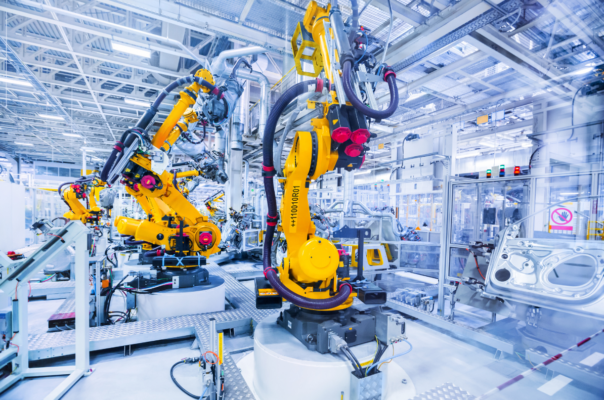
In your metal shop, getting things right and safe is key. Enter articulated robots, your heavy-duty helpers. They weld with unbeatable accuracy, making sure every joint is strong and clean. Picture them moving along metal seams smoothly, never missing a beat.
But there’s more. These robots are also your cutting and shaping experts. Need intricate designs on sheets or precise bends in pipes? They’ve got it covered. This means better quality and faster work in your shop.
Switching tasks? No problem. Going from welding to cutting is easy with a simple program switch. This flexibility keeps your shop ready for any job, making you more efficient and adaptable.
Safety improves, too. Robots do the risky stuff, like handling heavy metal or working near intense heat. This reduces accidents, keeping your team safer. They can focus on the finer details, where human skills shine.
For anyone in metal fabrication and machinery, using articulated robots is a smart move. They bring precision, versatility, and safety to your floor. With these robots, you’re not just working metal; you’re shaping a more productive and innovative future.
5. Pharmaceuticals & Healthcare:
In the world of medicine and healthcare, getting every little detail right can make a big difference. That’s where articulated robots come in, helping to make drugs and assist in surgeries with incredible precision. They’re changing how we make medicines and improve patient care, making sure everything is done just right.
Think about robots mixing drug ingredients, filling up capsules, and packing them without missing a beat. This means the medicines you rely on are made faster and without mistakes, ensuring you get exactly what you need for your health.
In the operating room, these robots are like a surgeon’s right hand. They help with surgeries, making tiny, precise movements that lead to less invasive procedures and faster healing. This is a big deal for making surgeries safer and more successful.
Switching from one task to another is easy for these robots. Whether it’s packing pills one day or helping in surgery the next, a quick update gets them ready. This versatility is a game-changer in both drug making and healthcare.
With robots doing the repetitive or super precise work, there’s less chance for errors and a higher level of care. This means safer medicines and surgeries for you.
For anyone involved in making medicines or healthcare, using articulated robots is a smart choice. They bring precision, flexibility, and a boost in care quality, helping push forward better treatments and outcomes.
6. Aerospace & Defense:
In aerospace and defense, precision isn’t just important—it’s everything. Articulated robots are key players here, ensuring every part of a jet or spacecraft is built perfectly. These robots work behind the scenes, making sure every component is up to the mark, from assembling tiny parts to applying protective coatings. This means faster assembly and fewer mistakes, keeping everyone safe.
Think of these robots as your ultimate tool for building and maintaining planes and spacecraft. They do jobs with a level of precision humans can’t match, like reaching into tight spots to check for damage or wear. This helps catch issues early, preventing bigger problems down the line and making sure everything runs smoothly and safely.
Switching tasks is easy for these robots. Need them to work on a satellite today and a fighter jet tomorrow? Just update their programming. Their ability to quickly adapt keeps your production flexible and cutting-edge.
For anyone in aerospace and defense, using articulated robots is a smart move. They bring the accuracy, flexibility, and dependability your field demands. With these robots, you’re not just building; you’re ensuring the highest standards of safety and reliability in the sky and beyond.
Conclusion:
Let’s sum it up: articulated robots are changing the game in manufacturing, no matter what you make. From cars and gadgets to snacks and space gear, these robots help you do things better and faster. They’re quick to learn new jobs, making your work smoother and more adaptable. Whether it’s joining metals, boxing up meds, or putting together planes, these robots are your secret weapon for top-notch productivity and quality. Getting these robots on your team means you’re ready to lead in your field. They’re more than just machines; they’re your key to staying on top in a tough market.
Do you want to compare different Industrial Robots?

